- Category
- Life in Ukraine
EURO 2024: The Genesis of a New Ukrainian Golden Generation?
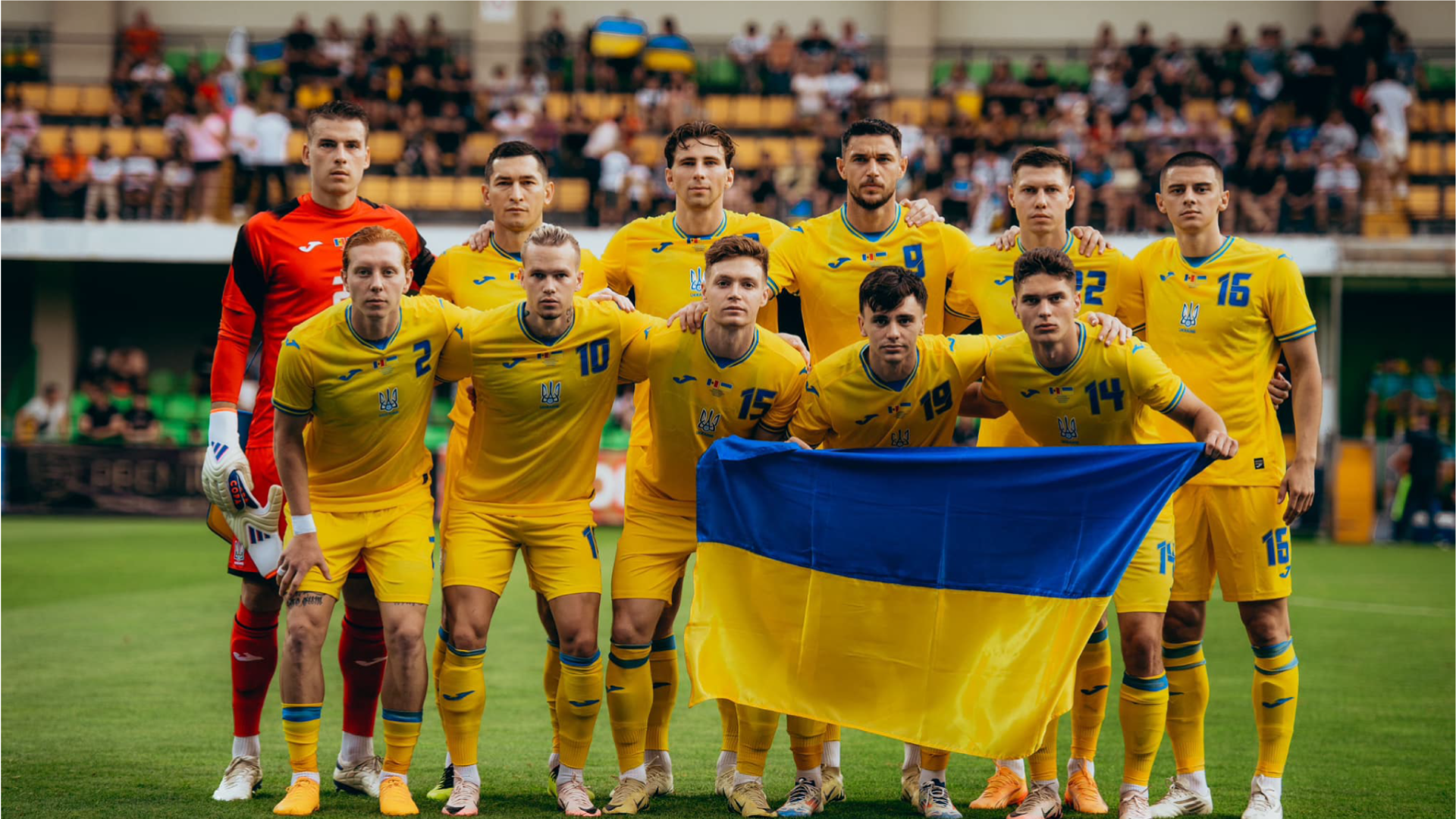
Ahead of Ukraine’s first match against Romania at EURO 2024 in Germany, we look at why many believe that this year’s team has the potential to be one of the best the country has had yet.
The current Ukrainian national football team looks to be shaping up to become the best in its history. This point of view has been recently posited by the captain of Ukraine’s national team Andriy Yarmolenko, who stated that this is the most talented squad the country has ever had. Head coach Serhiy Rebrov agreed with the sentiment that the team’s potential has a sky-high ceiling. But Rebrov did begin his retort by caveating it with the fact that Yarmolenko was probably referring to ‘the best’ squad that he has personally been a part of. In his eyes, the 2006 World Cup Ukrainian quarter-finalists still hold that position—for now.
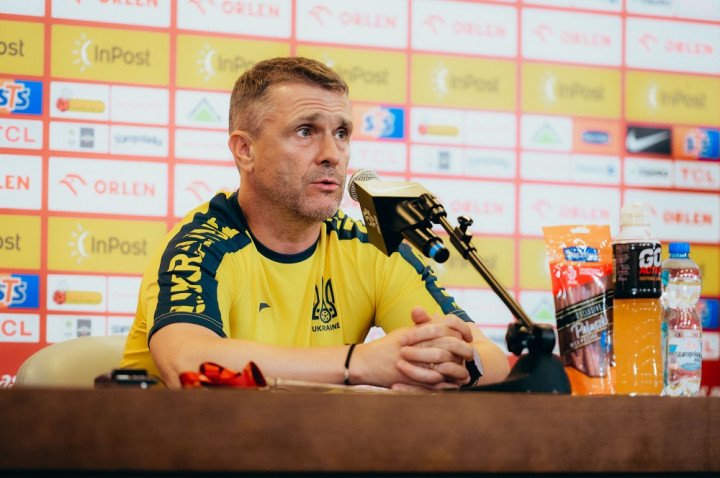
Nonetheless, with this topic reopening an interesting debate among fans, coaches, and media, it seems appropriate to provide some analysis on the subject.
Success in club competitions
Over the past three decades of independence, the main successes in Ukrainian football have come in the form of club competitions. FC Shakhtar won the last ever UEFA Cup in 2009 and regularly performs well in the group stages of continental tournaments—despite having to play football in forced internal exile for the past decade. FC Dynamo Kyiv reached the Champions League semi-final in 1999, and FC Dnipro were 2015 Europa League runners-up before tragically folding a few years later. In some circles, these achievements are considered greater successes than those of the national team in the same period.
The yellow-blues: a best of
Ukraine’s best-ever sides can probably be split into four separate eras. The first notable squad was Yozef Sabo’s Dynamo Kyiv-inspired national team of the late 1990s. They came agonizingly close to reaching the 1998 World Cup and EURO 2000 but sadly fell short in the playoffs on both occasions. The second was the Oleh Blokhin-led side that finished first in their qualifying group, reaching their first-ever major tournament and, in turn, reaching the 2006 World Cup quarter-finals in the process. The final two are the most recent incarnations.
Incidentally, those 2020 EURO and 2024 EURO teams have been headed by the two most recognizable and successful members of the aforementioned 1990s vintage—Shevchenko and Rebrov. But it is the current side that seems to be the most relatable, recognizable, and prospective of the lot.
Going back to the end of the 1990s, one of Ukraine’s most famous ever victories was a 3-2 win over Russia in Kyiv during qualification for EURO 2000. In that match and across the board for that era, the overwhelming majority played their football within Ukraine. It’s no coincidence that the spine of the team consisted of an FC Dynamo Kyiv core. That same core was beating the likes of Barcelona, Real Madrid, and Arsenal in the Champions League. Sadly, they couldn’t quite replicate that for the national team, and a major tournament evaded them. This is one of Ukrainian football’s greatest ‘what ifs’.
The first major tournament
The 2006 World Cup team did see a fair few of the 1990s era players finally get their chance at glory. Now considerably older and edging towards the latter years of their careers, Shevchenko, Shovkovskyi, Rebrov, and Husin, amongst others, gave a very good account of themselves as Ukraine made the Quarter Finals. They lost 3-0 to eventual winners, Italy.
The starting XI still consisted of predominantly domestic-based players. At this stage in Ukrainian history, a few more players had gone to explore leagues abroad, too. The most notable was Shevchenko, who became a world-class star at AC Milan. He had won the Ballon d’Or and Champions League while becoming Ukraine’s most globally recognized sportsperson. He was the talismanic star of that era.
Shevchenko as manager
10 years later, Shevchenko would go on to take charge as manager of Ukraine’s national team, overseeing one of the most impressive periods in Ukrainian football. The EURO 2020 qualifying campaign saw Ukraine end it unbeaten. They had finished top in a group that had the holders Portugal (at that time) in it, too. A young Oleksandr Zinchenko was starting to make a name for himself. Andriy Yarmolenko and Ruslan Malinovskyi were the key men in the team.
However, the pandemic came along and took the momentum out of this side’s sails. The Euros were delayed as a result, and being a couple of years older—with some injuries taking their toll too—the squad took on some enforced changes. Despite those setbacks, Ukraine reached the quarter-finals of that delayed tournament. It was the first time the national side had gotten past the European Championship group stages. That bit of history was achieved through a blend of determination and a fair bit of good fortune.
The modern-day challengers
The current crop of talent seems to be a bit different from these previous eras. At no other point in history has Ukraine’s national squad boasted as many stars representing elite clubs in Europe’s top five leagues.
Goalkeeper
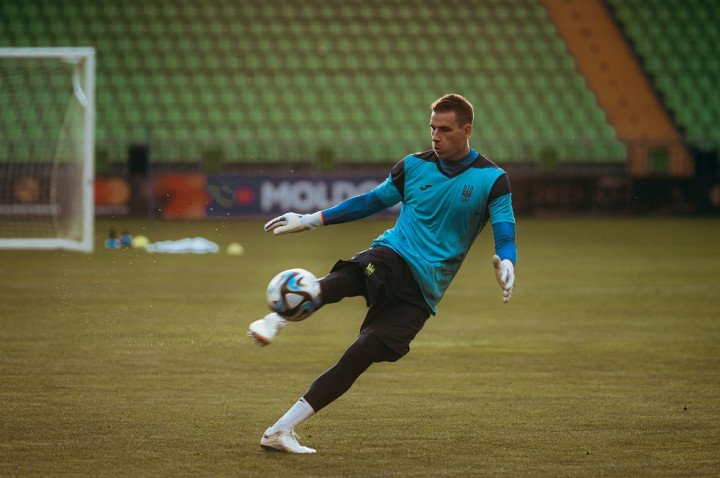
Andriy Lunin was Real Madrid’s goal keeper for most of the 2023-2024 season. The club won La Liga and the Champions League in the process, cementing itself as the best club side in the world this year. Lunin played a huge role in that success, delivering key performances in both competitions. Iconic Ukrainian goalkeepers of the past—Oleksandr Shovkovskyi and Andriy Pyatov were legends in their own right. However, with Lunin’s shot-stopping expertise and excellent feet, he has every chance to become Ukraine’s greatest ever goalkeeper in the future. In further disparity from the past, Lunin has an equally as good squad rival in Benfica’s Anatoliy Trubin. The pair provide healthy competition for one another and are easily interchangeable depending on their individual form.
Defenders
Similarly, at the back, Ukraine’s defenders used to almost exclusively ply their trade in the Ukrainian Premier League—or in leagues nearby. In recent years, this has changed drastically with Dynamo Kyiv academy graduates Illya Zabarnyi and Vitaliy Mykolenko becoming key men at their respective English clubs, following periods of adaptation. In 2023/2024, aged just 21, Zabarnyi played every minute of every game for his Bournemouth side in the league, bar one—and that was missed due to illness and not injury. That kind of assuredness and reliability, especially for a player of his age, has never been seen before in the senior Ukrainian national team ranks. He has astonishingly been a stalwart in the starting XI since the age of 18.
Vashchuk and Holovko, who played for Ukraine much earlier, were very good defenders in their own right. But with the development Zabarnyi has made at such a young age already, he genuinely has the potential to become one of the world’s best centre backs in years to come. He’s already showing good early signs of that.
Combined with Everton’s Mykolenko—who had a starring season at the club and seems to have found his best form in England—coupled with FC Shakhtar pair Mykola Matvienko and Yukhym Konoplya—who both regularly play and compete in the Champions League—there is a real abundance of quality in defense.
Leader
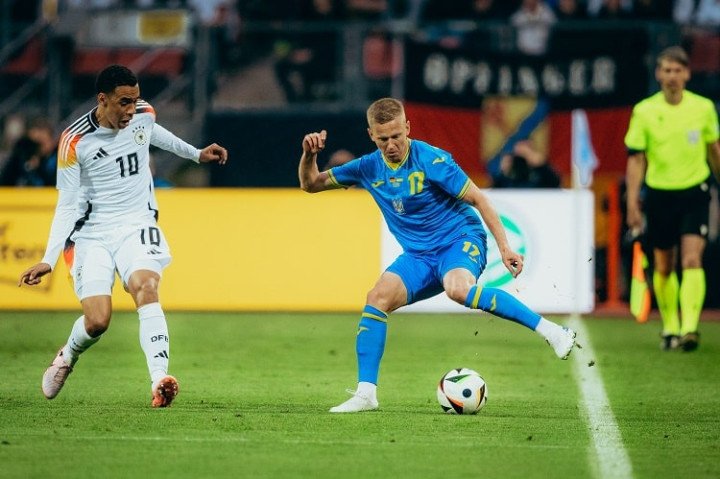
In the 1990s, the natural-born leader on the pitch was Oleh Luzhnyi. The former Dynamo, Arsenal, and Wolves defender once held the record for most appearances as Ukraine’s captain. Unfortunately for him, he never made it to a major tournament with Ukraine.
Fast forward to 2024 and it’s another Arsenal player that is taking on those leadership duties. Oleksandr Zinchenko does his talking both on and off the pitch. He’s a confident motivator and is a very good player too. He’s played in two of the best teams in the world in recent years and has been coached by one of the best managers in history—Pep Guardiola.
Zinchenko has harnessed that coaching and has become a much better player as a result. Even more so, given that he’s been playing as a left-back for his club for years despite starting out as an attacking midfielder. His versatility is really integral to Ukraine’s play as well. He can slot in comfortably in the centre of the park, or if required, shift to left back too.
Midfielders
Heorhii Sudakov may still be a Shakhtar player for the time being, but it’s very likely that it won’t be for much longer. He’s the kind of player that Ukraine has never really possessed before. A midfielder whose dribbling, passing, and intelligence are a delight to watch. He can see passes that others can’t and just glides with the ball at his feet. He is a new dimension player who ensures Ukraine’s midfield has great balance.
Veteran Taras Stepanenko and up-and-coming replacement Volodymyr Brazhko offer defensive insurance and stability. Meanwhile, Sudakov combines with Zinchenko to offer that box-to-box dynamism. It’s no surprise that he is being linked with a big move away to either England or Italy. His club side, FC Shakhtar, is expecting big money in return for their star asset, too.
Of course, the athleticism of the team is also at its peak. Never has a squad looked as fit and had as much natural explosive pace and strength across the park. Their dedication to the sport is also unparalleled. Many partake in extra curricular gym sessions with personal trainers and some are even teetotal.
Tsyhankov and Mudryk are their generation’s Konoplyanka and Yarmolenko. Yes, Yarmolenko is still part of the current squad, and it will take some beating to reach his goal tally (46), but the new-wave replacements look to be hungrier.
It has helped that Mudryk and Tsyhankov have moved to top leagues just before the peak of their careers. There is still room for improvement and development under new coaches.
Mudryk, himself is the most expensive Ukrainian player in history (€60M rising to €100M). He even achieved that move off the back of just a season and a half of consistent first team senior football. There’s so much raw talent in him, and this summer’s tournament is another opportunity to showcase and build on it.
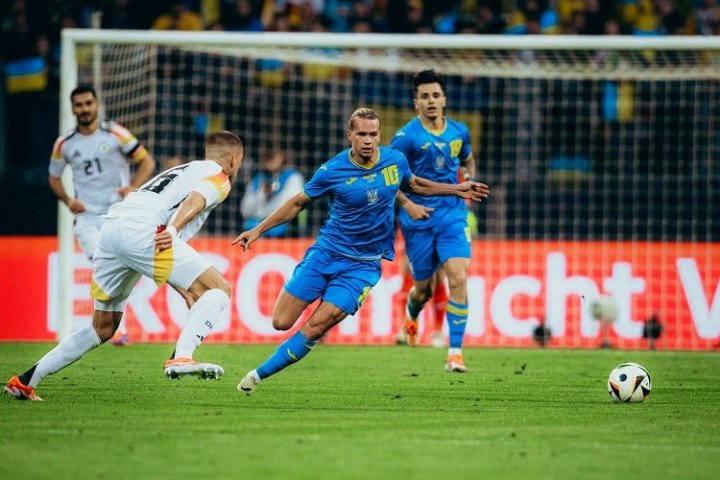
Natural born goalscorer
To round off the squad comparisons with former sides, Artem Dovbyk became the first Ukrainian striker to score 24 goals in a top European league for over 20 years. The last person to do so? A certain Andriy Shevchenko.
Since Shevchenko’s retirement in 2012, the national team has yearned for a potent and consistent goalscoring center forward. Artem Dovbyk seems to be fulfilling that prophecy. After 3 consecutive seasons of scoring goals for fun for his club sides, Dovbyk has already cemented himself as Ukraine’s best striker of the past decade. No other current Ukrainian centre-forward can come close to matching his numbers. Becoming the top scorer in La Liga while playing for a side that isn’t Barcelona or Real Madrid seemed improbable until Dovbyk came along. He became an overnight sensation at the last Euros following his late winner against Sweden. This time around, he’ll be wanting to try and continue his club form and put in a good fight for that golden boot.
Fulfilling the prophecy
All in all, this current Ukraine squad with Rebrov at its helm may not be its greatest-ever side just yet. However, it has every chance of becoming it. It has no greater chance to do so than this summer at the EUROs in Germany. There, it will be able to showcase its balance across the starting lineup. There is quality from the goalkeeper to the forwards. Never has a Ukrainian team boasted so much in form talent at once, either.
The fact that they’re young is also a positive. It shows that there’s room to grow even further. The sky really is the limit if things continue to progress at their current pace. If they show their best game, something that their compatriots at home expect of them, more than ever due to the current situation their country finds itself in, then maybe it will prove Andriy Yarmolenko’s assessment of his fellow teammates correct—that this team is indeed the greatest in Ukraine’s history.



-6ead6a9dd508115a5d69759e48e3cad1.jpg)
-29a1a43aba23f9bb779a1ac8b98d2121.jpeg)
-7f50738271c122a9b5e663cb80703dd6.jpg)

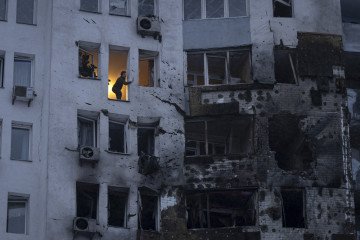
-554f0711f15a880af68b2550a739eee4.jpg)